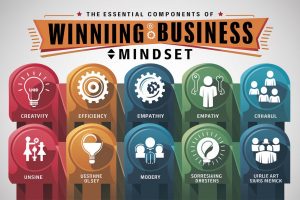A business mindset is not just a set of skills but a framework of thought that enables you to see opportunities where others see obstacles, to act where others hesitate, and to acquire value from every situation.
Success in the business world requires more than just a good idea or a strong work ethic; it demands a particular way of looking at challenges and a consistent drive to improve and innovate.
Those with a robust business mindset perceive change not as a threat but as a chance to succeed and grow.
To embody a business mindset, you must prioritize intentional goal-setting, strategic planning, and clear focus on executing daily tasks that contribute to long-term achievements.
It’s about embracing leadership roles, understanding the intricacies of financial management, and developing relationships that foster both customer satisfaction and brand loyalty.
By learning from setbacks and displaying resilience, you continuously build a foundation for sustainable business growth.
Moreover, cultivating this perspective requires a discipline that goes beyond individual success; it includes the ability to influence others and shape the future of a company.
Key Takeaways
- Embracing a business mindset opens avenues to recognize and seize opportunities.
- Effective strategy and consistent execution underpin the transition from ideas to tangible success.
- Resilience and adaptability are crucial for leveraging change and achieving growth in business.
Understanding the Business Mindset
A business mindset is the lens through which you view and navigate the commercial world.
It’s a combination of values, understanding, and attitudes that shapes your approach to business activities.
To cultivate such a mindset, you must align your thoughts and actions towards clear, strategic goals.
With an entrepreneurial mindset, you don’t just manage; you lead and innovate.
You recognize opportunities and are willing to take calculated risks for sustainable growth.
It is about embracing challenges as pathways to improvement rather than setbacks.
Adopting a positive mindset is foundational.
It encourages resilience and a proactive attitude, essential for navigating the uncertainties inherent in the business world.
Your perspective should focus on learning and adapting, rather than fearing failure.
Here is what typically encompasses a business mindset:
- Strategic Thinking: You should not only set goals but also devise actionable plans to achieve them.
- Leadership Skills: Leading by example and inspiring others is critical.
- Risk Management: Understand and/or mitigate risks, rather than avoid them.
- Growth-Oriented: Prioritize learning and development for yourself and your business.
- Financial Acumen: Maintain a strong grasp of the financial implications of your decisions.
To embody a business mindset, you should embrace a mentality of continuous improvement, where feedback is valued and applied, and success is measured not just in profits, but in the value, you create and the barriers you overcome.
Cultivating a Business Mindset
Developing a business mindset is integral to advancing your career and propelling your business forward.
It involves embracing key components and understanding their role in achieving both short-term and long-term goals.
Components of a Business Mindset
To cultivate a business mindset, focus on the growth mindset, which is fundamental for personal development.
Embracing challenges as opportunities for learning and improvement imparts resilience. Key components include:
- Motivation: Your desire to achieve should be strong and self-driven.
- Skills: A thorough set of business and interpersonal skills fosters effective leadership.
- Strategy: Employ clear strategies that reflect your understanding of business dynamics.
- Decision Making: Make informed decisions swiftly but carefully to navigate through obstacles.
Effective mindsets also incorporate work smarter principles, using resources efficiently to maximize performance.
The Role of a Business Mindset in Goal Achievement
Your business mindset plays a crucial role in setting and achieving business goals. Here’s how:
- Setting Goals: Define clear short-term goals and long-term goals. Your success depends on setting achievable targets that advance your business.
- Overcoming Obstacles: View challenges as stepping stones rather than roadblocks. Learning to overcome obstacles ensures continual business momentum.
- Performance: Track progress and maintain accountability to ensure consistent improvement.
A proactive business mindset equips you with the motivation and strategy to continuously develop the skills required for leading and achieving your desired outcomes.
The Importance of Leadership in Business
In the realm of business, leadership is not simply a role but the pivotal force that drives an organization’s progress and success.
Your capacity as a leader determines the direction, growth, and resilience of your company.
Developing Leadership Skills
To excel in a leadership position, you must continuously expand your leadership skills.
Acquiring these competencies isn’t just about gaining experience; it’s about intentional learning and practice.
Leadership training courses often provide a structured way to learn, but there’s also much to gain through direct mentorship and real-world application.
Accountability: As a leader, your ability to take ownership of both successes and failures within your organization is crucial.
It’s about setting an example of responsibility and fostering an environment where everyone feels empowered to contribute.
Ownership: Ownership goes beyond accountability; it involves investing your efforts to understand every aspect of the business and demonstrating hard work.
This commitment can inspire your team to adopt a similar mindset.
Mentorship: Your role often includes acting as a mentor.
Through guiding others, you don’t merely impart knowledge; you also cultivate future leaders within your organization, which is essential for its longevity and adaptability.
Continuous Learning: A business leader’s education is never complete.
Participate in leadership training sessions, stay updated on industry trends, and solicit feedback to fine-tune your approach to leading effectively.
Strategic Planning and Execution
Strategic planning is your roadmap to align your company’s vision with actionable steps.
It involves systematically organizing your goals to effectively position your business for future growth.
Through this process, you’re not just dream-weaving; you’re setting concrete objectives that will advance your business model.
Key Components of Strategic Planning:
- Vision Definition: Determining the ultimate goal for your business.
- Resource Allocation: Wisely distributing assets and manpower.
- Market Analysis: Understanding your competitive environment.
- Strategy Formulation: Crafting the approaches that will guide you to your results.
When you transition from planning to execution, it’s crucial to put your business acumen to work.
Execution breathes life into your strategies, turning the abstract into tangible results.
Steps for Successful Strategy Execution:
- Communication: Ensure that every team member understands the strategy.
- Alignment: Align jobs and teams with strategic goals.
- Measurement: Track progress and adapt as necessary.
- Innovation Control: Balance creativity with practical constraints.
Your purpose here is twofold: first, to establish a solid foundation through careful planning, and second, to translate this foundation into results through meticulous execution.
By doing so, you secure the bridge between the theoretical world of strategy and the practical world of business operations.
Stay sharp and responsive; agility within this process is paramount.
Remember, it’s not just about having a strategy, but how effectively you execute it that will define your success.
Optimizing Time Management and Focus
Effective time management and focus are critical components of a successful business mindset.
They enable you to work smart, enhancing your productivity and bringing you closer to your goals.
Here’s how you can optimize these two areas:
-
Awareness: Recognize and limit distractions — both digital and environmental — to maintain a concentrated work ethic. For example, turn off notifications and allocate specific times to check emails.
-
Arrangement: Organize your tasks using proven strategies such as the Eisenhower Matrix, which encourages prioritization by urgency and importance.
-
Adaptation: Adjust your plans as needed. Flexibility lets you respond to unexpected events without losing sight of your priorities.
| Technique | Purpose | Benefit |
|---|---|---|
| Pomodoro Timer | Break work into intervals | Prevents burnout, maintains focus |
| To-Do Lists | Organize tasks | Clarifies daily objectives |
| Time Blocking | Allocate time to specific tasks | Ensures important tasks get attention |
Financial Acumen and Investment
To excel in business, your understanding of financial acumen is crucial.
It’s about more than just balancing books; it entails the in-depth comprehension of financial management principles that propel companies towards profit maximization.
Your investment decisions should be driven by this acumen, aiming to generate considerable revenue.
- Financial Literacy: You need to decode complex financial statements. This literacy serves as your roadmap to interpreting financial health and potential.
- Budgeting: Meticulous budgeting skills ensure you allocate resources smartly, reducing waste and boosting efficiency.
- Forecasting: Anticipate future financial trends. Your prediction accuracy can vastly improve investment outcomes.
- Strategic Planning: Tie your financial insights into broader business strategies. This alignment is key to sustainable growth.
- Risk Assessment: Evaluate financial risks before they impact your bottom line. Proactive measures can save you from costly setbacks.
A sound investment isn’t just injecting capital into opportunities but making informed choices.
Incremental gains can build a strong foundation for long-term money growth.
True financial acumen empowers you to discern when to take bold steps or when a conservative approach is warranted.
Marketing and Customer Relationships
When you approach business with a strategic mindset, understanding the interplay between marketing and customer relationships is crucial.
Your customers sit at the heart of your business’s success.
Therefore, nurturing customer relationships through adept marketing is not just beneficial; it’s essential.
Marketing isn’t merely about pushing for sales; it’s about creating a brand identity that resonates with your consumer base.
It’s an invaluable tool that enables you to:
- Connect: Reach out to your customers and initiate conversations.
- Engage: Provide valuable content, answer inquiries, and build relationships.
- Understand: Gain insights into customer preferences and behaviors.
| Key Aspect | Description |
|---|---|
| Networking | Cultivate a community around your brand. |
| Customer Trust | Earn loyalty through consistent and honest communication. |
| Brand Identity | Develop and maintain a strong, recognizable brand. |
| Sales Growth | Foster an environment that encourages repeat business. |
Effective marketing should transition smoothly into sales, as strong relationships often lead to repeat business and referrals.
Your outreach must authentically address your customers’ needs and interests, thus positioning your business as the go-to solution.
Networking is the backbone that supports the structure of customer engagement.
It extends beyond mere interactions to forming meaningful connections that empower your business’s growth.
Innovation and Growth in Business
In the landscape of modern business, innovation is the cornerstone that distinguishes successful companies from others in a crowded market.
When you focus on innovation, you’re investing in novel products, services, or models that add value—crucially lifting your company above the competition.
For your company to achieve growth, staying attuned to market trends is essential.
Continuous adaptation ensures your services meet ever-evolving customer needs, ultimately driving profitability.
Remember, innovation is not limited to groundbreaking technology; it often manifests as incremental improvements to what you already offer.
Incorporating innovation strategically can lead to:
- Gain a Competitive Edge: Develop unique offerings for competitiveness.
- Customer Satisfaction: Align products with customer expectations.
- Operational Excellence: Streamline processes for better efficiency.
To maintain relevance and growth in your business, adopt a growth mindset and foster a culture that prizes creative thinking.
Your ability to innovate effectively can result in a thriving business model that not only meets the current market needs but also anticipates and shapes future demands.
By internalizing a business mindset centered around innovation, you’re more likely to witness sustained growth.
Companies that prioritize innovative practices tend to excel, making this approach indispensable in today’s fast-paced business environment.
Learning from Failure and Building Resilience
Your journey in business will inevitably involve encountering failure.
Understanding the role failure plays and how to learn from it is pivotal.
It is not the occurrence of failure that defines your business acuity, but rather, how you respond to it.
Learning from failure is about dissecting setbacks and extracting actionable insights without allowing them to hinder your progress.
Resilience in business is the stamina to face challenges and rebound from them swiftly.
Developing resilience can stem from various practices, including meditation and mindfulness.
These techniques aid in stress management by keeping you grounded and focused, enabling clearer thinking during adversity.
By incorporating regular meditation into your routine, you enhance your capacity to remain calm and maintain perspective in the face of failure.
- Recognize failure as a feedback mechanism.
- Reflect on what went wrong and how it can inform future strategies.
- Practice mindfulness to stay present and approach setbacks with a clear head.
| Action Step | Purpose |
|---|---|
| Identify lessons | Convert failure into learning opportunities. |
| Engage in reflection | Understand your decision-making process. |
| Practice stress relief | Maintain emotional and mental balance. |
Frequently Asked Questions
In this section, you’ll find answers to common queries about the nature of a business mindset and its significance in reaching business objectives.
1. How does a business mindset contribute to entrepreneurial success?
A business mindset is crucial as it equips you with a leadership perspective, encouraging proactive steps towards achieving business goals and driving growth.
By focusing on strategy and implementation, you are well-positioned to navigate the challenges of entrepreneurship.
2. What are the key differences between a business mindset and an employee mindset?
The key differences hinge on ownership and initiative—the business mindset is about setting visions and taking calculated risks, whereas an employee mindset typically involves executing given tasks.
Understanding these differences can influence your approach to work and personal development.
3. Why is a strong mindset critical for business leaders in goal attainment?
A strong mindset fosters resilience, strategic thinking, and decision-making abilities that are paramount for business leaders.
When facing competitive and market pressures, these qualities are central to sustaining performance and achieving objectives.
4. What strategies can individuals adopt to develop a business mindset?
Individuals can adopt strategies such as taking full accountability for actions, focusing on solutions, and learning from setbacks.
Embracing these strategies aids in nurturing a mindset that is aligned with entrepreneurial success.
5. How does an entrepreneurial mindset influence decision-making and innovation?
An entrepreneurial mindset drives you to make decisions that push the boundaries of innovation, seeking opportunities for improvement and disruption.
This forward-thinking approach is instrumental in carving out a competitive edge in the marketplace.
6. What are the defining traits that make up a successful business mindset?
Successful business mindsets are characterized by traits such as accountability, resilience, strategic vision, and a continuous quest for learning.
Exhibiting these traits can lead to better organizational outcomes and personal growth.






